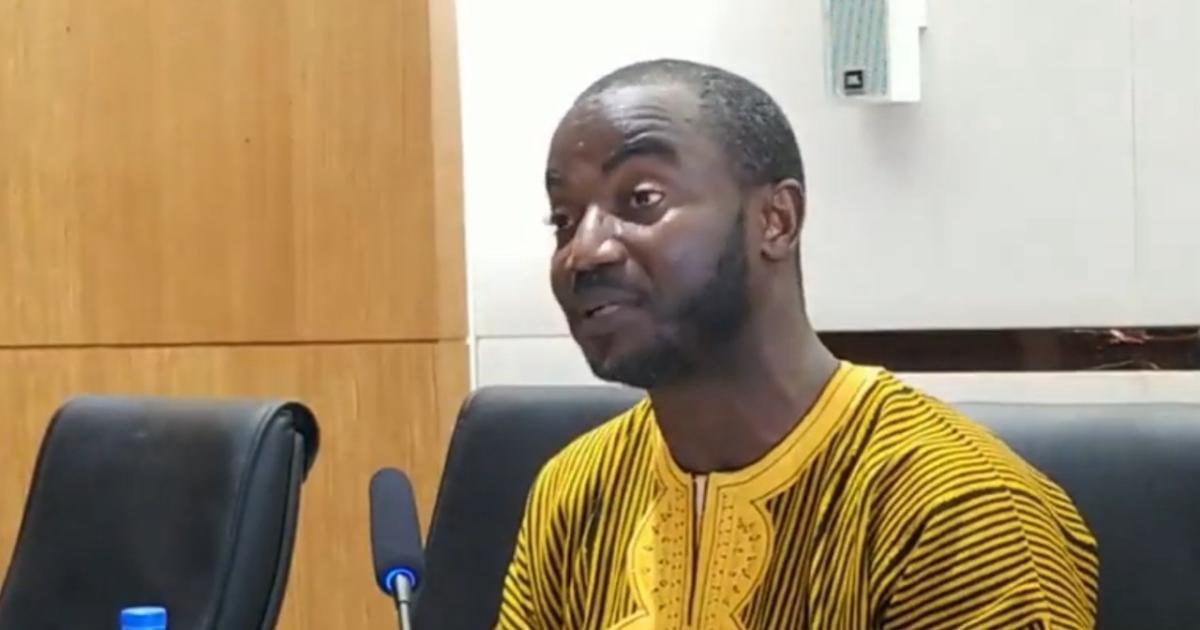Africa-Press – Liberia. Boima Kamara, the newly designated Minister of Finance and Development Planning, has said that, as the chief driver of the country’s fiscal policy, he intends to focus on significant investments in the Liberian private sector, aiming to make it the engine of economic growth and the largest employer in the country.
With an emphasis on supporting smallholders in the agricultural sector and promoting the slogan “Made in Liberia”, the ambitious Kamara wants the country to gravitate towards industrialization, which would lead to the creation of a self-reliant economy.
By implementing these measures, Liberia has the potential to boost economic development, reduce unemployment, and improve the lives of its citizens, the Finance Minister designate said at the Senate during his confirmation hearing on Wednesday, January 31. He emphasized the need for the private sector to become the driving force behind economic growth and the biggest employer in the country.
“”The time has come to move away from the government being the larger employer to the private sector as the anchor for sustainable growth and development,” he said, however arguing that the absence of the capital market in Liberia is another problem for raising needed capital for development.
He believes that tangible investments, particularly in the agriculture and food chain, will provide a solid foundation for this goal.
Kamara stressed the importance of supporting smallholders in the sector, ensuring that they receive the necessary resources and guidance to succeed. By smartly supporting this crucial sector, Kamara hopes to kickstart socio-economic development and improve livelihoods in Liberia.
The Liberian economy is currently in dire straits, according to President Joseph Nyuma Boakai, and there is a need for robust efforts to ensure improvement.
During his State of the Nation address on Monday, the President disclosed that the state of the economy calls for concern amid the current nature of the perennial unemployment and economic instability citizens face. He added that poverty, drug abuse, corruption, poor infrastructure, and an underperforming economy continue to undermine national development and the livelihood of Liberians.
The President reemphasized his government’s commitment to rescue the nation, as revealed in the ARREST Agenda. He said it is high time Liberians harness opportunities in agriculture, roads, and infrastructure development, improve the rule of law, rethink the education sector, improve sanitation, and unlock the potential of the tourism sector.
“We believe that creating economic linkages between these development facets and reinforcing them will help reverse years of economic downturns,” the President said. “We must not just recognize the pain and frustration that permeates our society, but also work together to introduce and pass legislation that will prioritize economic reforms that foster sustainable economic growth and job creation.”
Liberia’s economic growth slowed between 2022 and 2023, from 4.8 percent to 4.6 percent. The rate of growth averaged about 1.5 percent, compared with 3.1 percent between 2012 and 2017 due in part to an underperforming economy and the existing geo-political global environment.
Boakai said the economy faced challenges during the past six years in terms of growth, job creation, and poverty reduction. “Inflation during the period 2023 rose to 10.1 percent at the end of December, from 7.6 percent in 2022. Revenue collection, as reported for 2023, stood at US$710.23 million while expenditure totaled US$796.32 million; hence, a large budget deficit of over US$80 million,” he said.
The President further noted that his administration intends to change the state of the economy by thinking “outside the box”, doing away with reliance on primary commodity export to focusing on value addition with the private sector as the engine to drive the economy.
In line with the President’s vision, Finance Minister-designate Kamara proposed a new economic model for Liberia, one that resonates with all Liberians, especially policymakers. He advocates for a slogan called “Made in Liberia,” which aims to prioritize industrialization.
This slogan reflects the vision of creating a self-reliant economy, where locally produced goods and services are the foundation for sustainable growth. Investing in the private sector and promoting industrialization will not only boost economic growth but also address the issue of high unemployment rates in the country.
Kamara’s concept also aligns with the President’s pronouncement of the reintroduction of the Liberianization policy, which would help to empower Liberian businesses and promote growth and job creation. “In our quest to expand the economy, we will leverage Information Communication Technology (ICT) in creating jobs, especially for our youth,” the President said.
By creating more job opportunities, Kamara told the Senators that Liberia can reduce poverty and improve the standard of living for its citizens. Kamara’s emphasis on the private sector as an engine of growth is a step towards transforming Liberia’s economy.
“When confirmed as Minister, we will work hard with your collaboration and support to reposition our economy on a sustainable path of growth informed by a pending new national plan that places more emphasis on agriculture, roads, and education,” the Finance Minister-designate added. Kamara, a former CBL Deputy Governor with more than two decades in finance, fiscal, and monetary affairs both at national and international levels, said such a direction will lead to securing and sustaining financing for critical investment and ensure the optimization of public resources, where efficiency gains are clearly among all Liberians.
Experts believe that by encouraging investments and supporting smallholders in the agricultural sector, the Finance Minister would be laying the groundwork for a more vibrant and diversified economy.
The proposed economic model of “Made in Liberia” aims to enhance local production, reduce dependence on imports, and accelerate industrialization.
However, implementing these ambitious plans will require strategic planning, collaboration with stakeholders, and a supportive regulatory environment. Kamara recognizes the need for policymakers and all Liberians to rally behind this vision, ensuring its successful implementation and long-term impact.
For More News And Analysis About Liberia Follow Africa-Press






